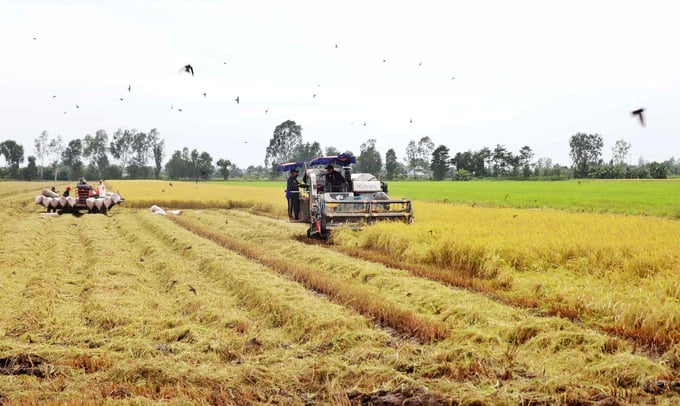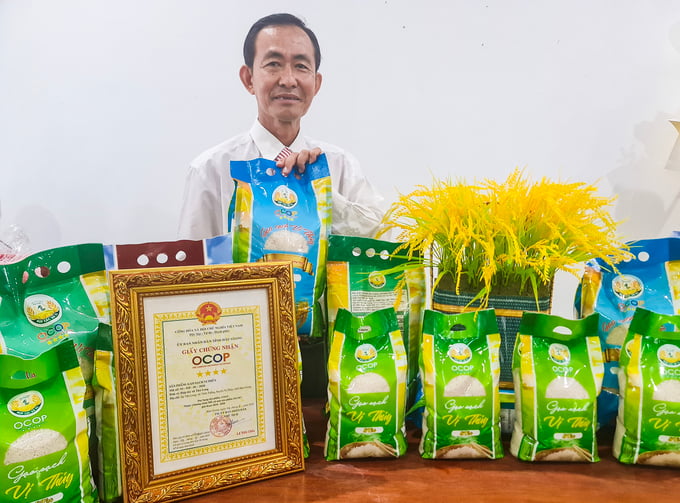June 15, 2025 | 20:14 GMT +7
June 15, 2025 | 20:14 GMT +7
Hotline: 0913.378.918
June 15, 2025 | 20:14 GMT +7
Hotline: 0913.378.918
Despite its exclusion from the Government's Organic Agriculture Development Project from 2020 to 2030, Can Tho city remains determined to establish an organic rice area with an estimated scale of 4,000 hectares.
The city is currently conducting surveys in areas with potential to be included in the planning for the development of organic rice production models, with strict technical criteria including no chemical input and no genetically modified seed. Furthermore, the city aims to redesign an independent irrigation system to ensure a synchronized water source.

Can Tho city's Department of Agriculture and Rural Development is determined to establish an organic rice production area with an estimated scale of 4,000 hectares. Photo: Kim Anh.
Regarding this development direction, Mr. Tran Thai Nghiem, Deputy Director of the Can Tho city's Department of Agriculture and Rural Development, stated that after the planning for local organic rice production is completed, the agricultural sector will implement various production approaches to minimize chemical inputs. This transition phase is expected to take approximately two to three years, during which farmers and businesses must accept a significant reduction in rice productivity.
This process also highlights the importance of a strong and committed collaboration between farmers and businesses. If this partnership lacks cohesion and a long-term commitment, it becomes challenging to bear substantial losses.
Based on practical research, multiple businesses began showing interest in implementing an organic rice model covering 50 hectares in Can Tho city in 2022. Under this model, businesses will guarantee a profit of 50 million Vietnamese dong per hectare for local farmers. At the time, this investment initiative was highly regarded, and farmers enjoyed considerable profits.
However, after the first pilot model, businesses reportedly fail to sustain and expand their operations. According to technical standards for organic rice production, in addition to the absence of chemicals in the production process, businesses must establish a water treatment system when extracting water from rivers for irrigation in the fields. However, businesses were unable to find areas with sufficient space to accomodate said water treatment system.
After completing the survey and identifying potential organic rice production area, the agricultural sector will advise Can Tho City People's Committee on issuing a set of regulations for production practices within the organic rice area.
Mr. Tran Thai Nghiem assessed that the potential for developing the organic rice production area in Can Tho city, and the Mekong Delta region as a whole, is significant. According to him, the region contains a total of 25 million tons of straw, which, if systematically collected, can serve as a abundant source of organic fertilizer.
Results from the pilot model conducted by the International Rice Research Institute (IRRI) in Can Tho city indicated that 9 tons of straw can potentially yield 7 tons of organic fertilizer. Consequently, Can Tho city can fully utilize its advanced biotechnology to influence the process of organic rice production.
Dai Duong Xanh Company is an exemplary business in establishing a strong brand for organic rice in the international market. The company reported that the organic rice production partnerships have eliminated farmers' concerns regarding investment costs, as the company commits to purchasing at prices ranging from 7,000 to 8,000 Vietnamese dong per kilogram.

Organic rice production area belonging to Dai Duong Xanh Company in Ca Mau province. Photo: Kim Anh.
Dai Duong Xanh Company is currently establishing partnerships and purchasing rice for local cooperatives under two forms: organic-certified rice and residual rice (using fertilizers and plant protection chemicals within permitted limits).
According to Mr. Mai Van Tung, the raw material manager at Dai Duong Xanh Company, implementation of the organic rice production model posed considerable challenges. Accordingly, only 30% of the local farmers participating in partnerships have complied with the company's standards within the last three to four years. Subsequently, this rate had increased to 70% in the winter-spring crop of 2022-2023. However, due to recent fluctuations in rice prices, farmers have reverted to traditional production practices.
Mr. Tung expressed his strong desire to designate collaborative areas for organic rice production. However, this endeavor has not proven successful thus far, and the associated investment costs are substantial. Presently, the shrimp-rice production areas in the provinces of Kien Giang and Ca Mau stand out as advantageous for the development of organic rice.
Mr. Tung evaluated that the transition to organic rice production in Can Tho city is a significant challenge due to the limitations in the irrigation system, and a the lack of credibility with farmers. Accordingly, a plan for an organic rice production area can be severely affected by the resistance of a single farmer.
Can Tho city has been identified as possessing the significant advantage of being the center of the Mekong Delta region, where farmers face minimal challenges in terms of rice consumption. Namely, Co Do district has been assessed to possess considerable potential for developing organic rice raw material area, equipped with complete embankments, enclosed pumping stations, and promising future development.
Dai Duong Xanh Company has also committed to partnering with the agricultural sector in Can Tho city to establish a local organic rice raw material area. This is a direction that the company has identified for its future investments in response to the global trend towards organic and environmentally friendly products.

According to Dai Duong Xanh Company, the export price of organic rice is at least 40% to 50% higher compared to that of traditionally produced rice, and market demand for the former has been gradually increasing over the last two years. Photo: Kim Anh.
However, during the initial transition phase, the company requires support from the government in terms of planning and redesigning the irrigation system.
Subsequently, Dai Duong Xanh Company will collaborate with cooperatives and farming groups to produce organic rice in accordance with the company's prescribed process. The company will provide input materials, and farmers will assume the role of rice field care. Prices will be negotiated and agreed upon at the beginning of each season, based on the price of traditionally produced rice plus an additional 800 to 1,000 Vietnamese dong per kilogram.
Dai Duong Xanh Company exports an average of 100,000 tons of various rice types annually, including 700 to 800 tons of organic rice. The company's primary export target markets include the United Kingdom, the United States, Europe, and the Middle East. Additionally, the company's most popular rice variety is ST5, which known for its soft and dry texture.
Within the last two years, the price of organic rice exports has increased by 40 to 50% compared to that of traditionally produced rice, and market demand has gradually recovered. The company has established 800 hectares of organic rice raw material areas through partnerships with three cooperatives in Kien Giang province and one cooperative in Ca Mau province.
Vi Thuy district in Hau Giang province has experienced a significant shift from traditional to organic rice production. Between 2020 and 2021, farmers and cooperatives in the district were directed to produce rice using 50% organic fertilizer. According to statistics from Vi Thuy district's Department of Agriculture and Rural Development, local farmers currently produce an average of 1,500 to 2,000 hectares of organic rice every year.

Vi Thuy clean rice, one of the VietGAP-compliant rice brands with a strong focus on organic production, is flourishing in Hau Giang province. Photo: Kim Anh.
Mr. Truong Van Tri, Head of Vi Thuy district's Department of Agriculture and Rural Development, stated that with support from the Center for Agricultural Extension and Services in Hau Giang, the province plans to establish 100 hectares of GlobalGAP-compliant production area in the winter-spring crop of 2023-2024. On the other hand, Hau Giang province aims to establish 100 hectares of VietGAP-compliant rice production area. These production areas will serve as a crucial foundation for the province's gradual shift towards organic rice production.
Vi Thuy district currently houses 240 hectares of VietGAP-compliant rice production area, which is distributed across Tan Long Agricultural Cooperative in Vinh Tuong commune, Vi Thuy Agricultural Cooperative 1 in Vi Thuy commune, and Kien Thanh Agricultural and Service Cooperative in Vi Binh commune.
"The local agricultural sector realized that organic and standardized production is a sustainable solution to attract businesses to participate in seasonal partnerships. Local farmers in Vi Binh commune have successfully partnered with businesses, and the purchase price for their rice has been higher than those produced outside partnerships by 300 to 500 Vietnamese dong per kilogram," Mr. Tri shared.
Vi Thuy district currently has 3,000 hectares of rice production area linked with purchasing businesses, with plans to expand by an additional 1,000 hectares in the near future.
On June 23, 2020, the Prime Minister approved Decision No. 885/QD-TTg on the Organic Agriculture Development Project from 2020 to 2030. The Decision includes the task of establishing production areas for key local products with the potential to establish brands and geographical indications with a focus on organic production.
Additionally, the total organic rice production area nationwide is expected to reach 50,000 to 70,000 hectares by 2025 and 100,000 to 150,000 hectares by 2030. This effort includes the development of organic shrimp-rice production models in select provinces in the Mekong Delta region, with a scale ranging from 100 to 200 hectares.
Translated by Nguyen Hai Long
![Turning wind and rain into action: [4] Bringing climate bulletins to remote and isolated areas](https://t.ex-cdn.com/nongnghiepmoitruong.vn/608w/files/linhnhp/2025/06/14/1152-z6704423696987_15fd32ffc26d590d204d520c9dac6786-nongnghiep-151141.jpg)
(VAN) The Vietnam Agriculture and Nature Newspaper interviewed Mr. Vu Thai Truong, Acting Head of Climate Change and Environment at UNDP Vietnam, to gain deeper insight into how climate bulletins are delivered to farmers.

(VAN) In Tien Giang, a high-tech shrimp farm has developed a distinctive energy-saving farming model that has yielded promising results.
![Turning wind and rain into action: [3] 300.000 farmers benefit from agro-climatic bulletins](https://t.ex-cdn.com/nongnghiepmoitruong.vn/608w/files/news/2025/06/12/e5a48259d6a262fc3bb3-nongnghiep-125122.jpg)
(VAN) The agro-climatic bulletin has become a valuable tool for farmers in the Mekong Delta. After more than five years of implementation, the initiative is gradually being expanded nationwide.
![Turning wind and rain into action: [2] Providing forecasts to the people](https://t.ex-cdn.com/nongnghiepmoitruong.vn/608w/files/news/2025/06/12/e5a48259d6a262fc3bb3-nongnghiep-103927.jpg)
(VAN) In addition to improving the quality of hydrometeorological forecasts, putting forecast bulletins into practical use is crucial for production and disaster prevention.

(VAN) Blue carbon is receiving attention for its rapid absorption capacity and vast potential. It represents a promising nature-based solution to respond to climate change.
/2025/06/11/3507-1-161904_583.jpg)
(VAN) Seagrass beds and coral reefs serve as 'cradles' that nurture life in the ocean depths, creating rich aquatic resources in Vietnamese waters.
![Turning wind and rain into action: [1] Forecasting for farmers](https://t.ex-cdn.com/nongnghiepmoitruong.vn/608w/files/news/2025/06/11/e5a48259d6a262fc3bb3-nongnghiep-111919.jpg)
(VAN) Weather is no longer just a matter of fate. Forecasts have now become an essential companion for farmers in every crop season.